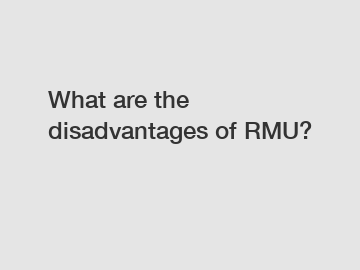What are the disadvantages of RMU?
### Disadvantages of Remote Metering Units (RMUs).
Remote Metering Units (RMUs) have become popular in various industries due to their ability to remotely monitor and control equipment. However, there are some disadvantages associated with the use of RMUs. .
#### Limited Connectivity Options.

One of the main disadvantages of RMUs is the limited connectivity options. RMUs often rely on specific communication protocols, which may not be compatible with existing systems or equipment. This can lead to difficulties in integrating RMUs with other devices, resulting in a lack of interoperability.
#### Data Security Concerns.
Another disadvantage of RMUs is the potential for data security concerns. Since RMUs collect and transmit data wirelessly, there is a risk of unauthorized access or data breaches. Without proper security measures in place, sensitive information could be compromised, leading to potential safety risks and privacy issues.
#### Maintenance and Upkeep Costs.
Related links:Is drawout type metal clad cabinet the future of industrial storage solutions?
How to properly maintain a power distribution cabinet?
Exploring the Benefits of Using Earthing Switch
How Does solar panel system Work?
Linear Dampers vs Industrial Shock Absorbers
Key points for on-site inspection of explosion-proof electrical equipment
How to Choose the Best HELL Engraving Stylus with Wing
Maintaining RMUs can be costly, as they require regular maintenance and updates to ensure optimal performance. This includes periodic inspections, software updates, and potential repairs. Additionally, RMUs may need to be replaced over time as technology advances, adding to the overall cost of ownership.
#### Reliability Issues.
RMUs rely on various components, including sensors and communication devices, to function properly. If any of these components fail or malfunction, it can lead to reliability issues with the RMU. Without reliable data collection and transmission, the effectiveness of the RMU is compromised, impacting operations and decision-making processes.
#### Lack of Flexibility.
RMUs are often designed for specific applications or industries, limiting their flexibility for use in different scenarios. This can be a disadvantage for organizations that require versatile solutions that can adapt to changing needs or environments. Retrofitting or customizing RMUs to meet specific requirements can be complex and costly.
In conclusion, while RMUs offer many benefits in terms of remote monitoring and control, there are also several disadvantages that should be considered before implementation. These include limited connectivity options, data security concerns, maintenance and upkeep costs, reliability issues, and lack of flexibility. By addressing these drawbacks proactively, organizations can maximize the benefits of RMUs while minimizing potential challenges.
If you are looking for more details, kindly visit switchgear sf6, indoor switchgear, cable branch box.
Related links:What Factors Influence Your Lead Antimony Alloy Anode Choices?
What equipment is used for refrigeration?
Die Verwendung von wandmontierten Batterien: Eine nachhaltige Energielösung für deutsche Haushalte und Unternehmen
Top 5 Benefits of Using Explosion Proof LED Lights in Industry
Top Power Solutions for the Architecture Industry: Enhance Efficiency and Sustainability
Top Benefits of Explosion Proof LED High Bays
Explosion Proof Lighting Fixtures vs Standard Lighting: Key Differences Explained

